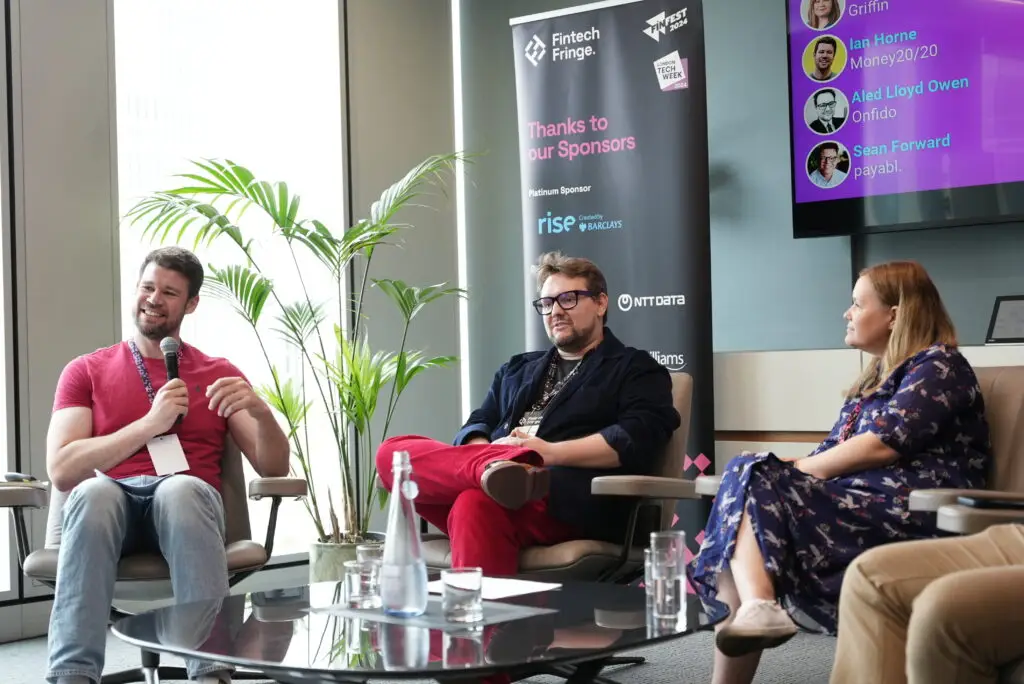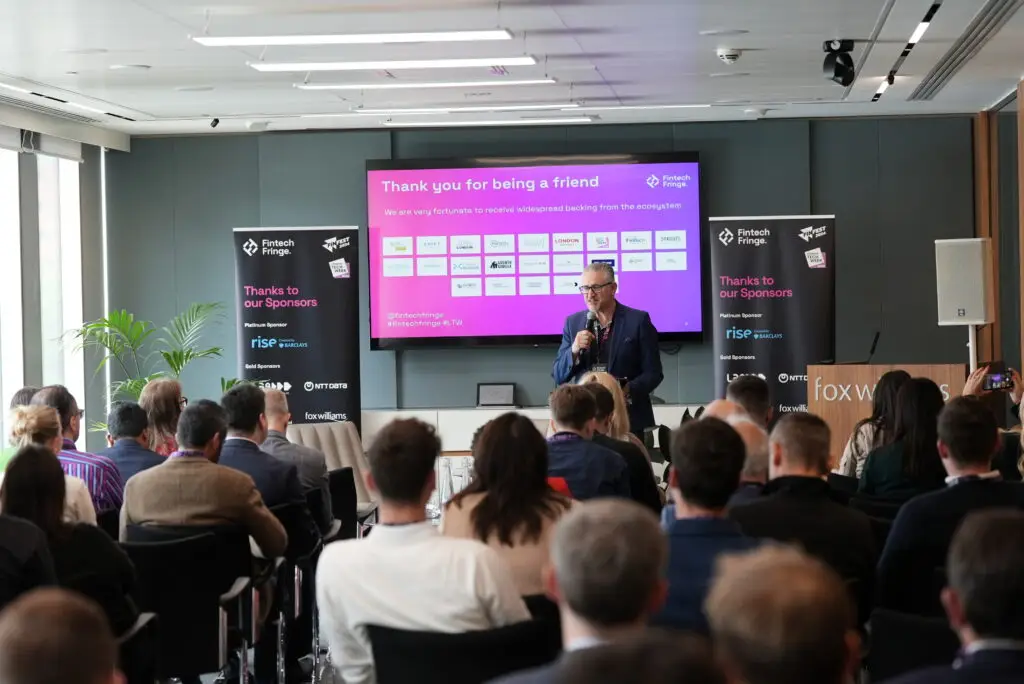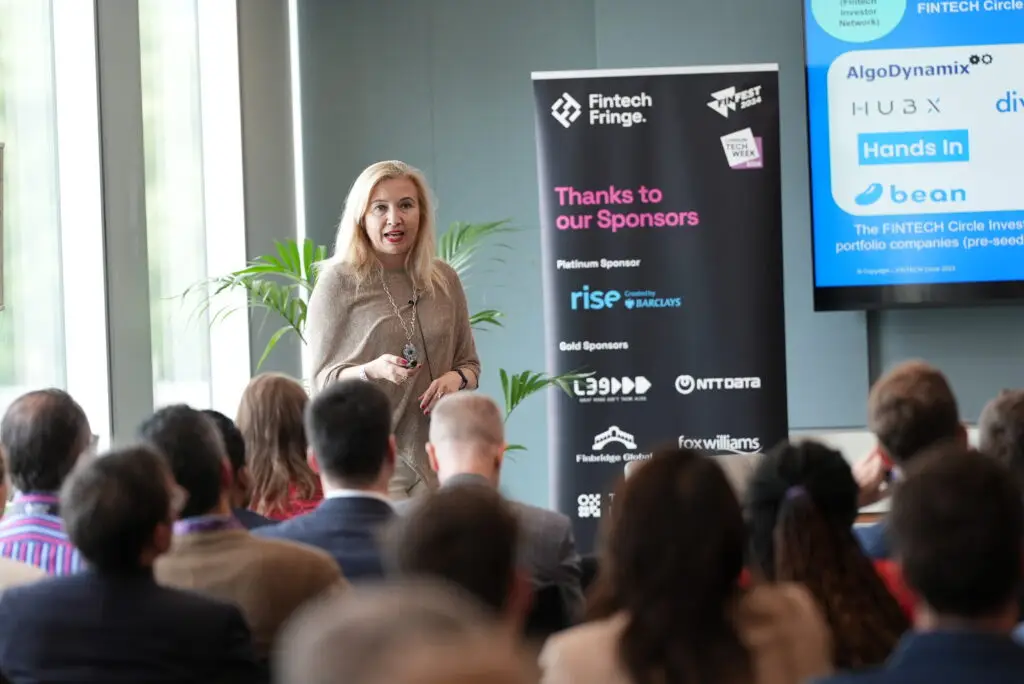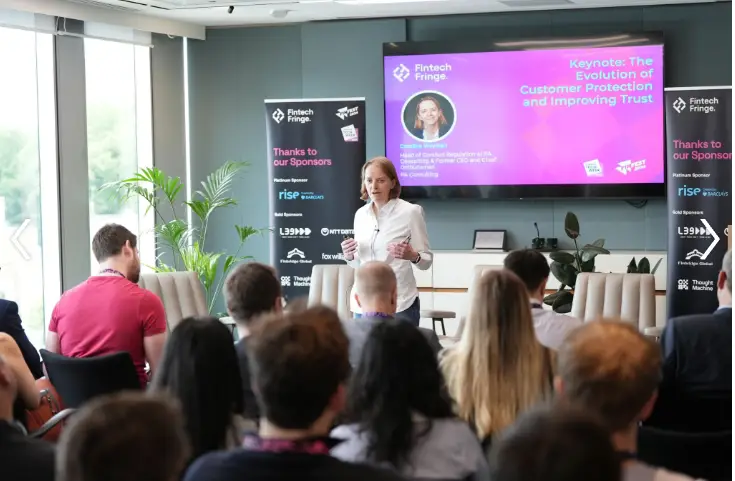Reg & Compliance / Investment
On the final day we were hosted by the brilliant Fox Williams with their incredible event space overlooking the gorgeous HAC grounds in Finsbury Square.

Regulation and Compliance Conference
We were delighted to have Money 20/20’s Head of Content EMEA, Ian Horne join us fresh out of Amsterdam to moderate.
Caroline Wayman’s powerful keynote on the evolution of customer protection. Wayman really brought home how it can go wrong if the consumer is not protected in finance, even to the tune of over £30 Billion… One of the biggest issues in the finance industry is that “it always takes quite a long time for the sector to accept there’s a problem. ”
It was also fascinating hearing her perspective on utilising “Open Banking for unprecedented growth.” However “there’s all sorts of innovation that can go wrong here. When we’re using banking data and we’re strapping some APIs to it, there’s probably things that can go wrong too. We want to be optimistic. We want to innovate, but we need to do this in a regulatory compliant way. “
With that in mind the bar was set. The day continued with so many engaging discussions, we can’t cover them all but here is a round up!
The Ultimate Fintech Scale Up Legal Guide
Chris Hill, a partner at Fox Williams – a legal firm that specialises in working with fintechs conducted a standout presentation on the legal strategies for fintech scale-ups, stressing the importance of avoiding legal blind spots during long sale cycles with big institutions.
To this end he described it as “taming the gorilla!” It goes so far beyond just having a great product, you should even “Investigate the bank’s procurement process and Identify key decision-makers at each stage of the process and their role”

How to make friends not enemies
Our legendary MC, Ian Horne went on to moderate a session featuring Dora Grant CRO from Griffin, Sean Forward CEO at payabl. and Aled Lloyd Owens from Onfido. The panel looked into how to initiate conversations and relationships with the regulators, something fintechs typically struggle with. Grant set the scale here by describing the situation as “establishing a good relationship from the beginning is crucial. And the reason being is they are the decision makers, and everything they tell you will not make you weaker, will make you stronger.”
Foward took us through his experience with the FCA at payabl. “I think one of the really interesting pieces of our journey was once the interaction with the FCA actually begins, when you’re actually talking with people rather than just a paper exercise, the depth of knowledge that the individuals that you interact with with the FCA is really high. We found the depth of the understanding extremely high, even about our own business. The emphasis on having a really, really strong business plan that can be challenged because it will be challenged was something that really also helped us as a business as we went through the process.”

Fundraising Conference
Our final track of the week concluded with the Godfather of fintech Eric Van Der Kliej Mcing who is a pivotal figure responsible for helping to forge the fintech ecosytem in the UK. Van Der Kliej highlighted the evolution of the ecosystem and the important role of initiatives like Level 39 and Innovate Finance in fostering innovation and growth.
He added, “This is the next generation right. This is going to build the next decade of growth.”

Our Keynote for the track was from Angel Investor and industry connector Susanne Chishte who shared a candid analysis of the current investment trends in the fintech sector. She noted a significant decline in global fintech investments, dropping from $48 billion in 2019 to an estimated $30 billion for the current year. This reduction in available capital affects both startups and scale-ups seeking follow-up funding. Companies are now focused on reducing burn rates and preserving capital, with many opting for acquisitions at lower valuations as a survival strategy.

She had Five Key Trends for fintech investment:
- Artificial Intelligence: AI, particularly generative AI, presents vast opportunities for fintech companies to enhance efficiency and investment potential. However, it also poses risks, such as the decline in graduate job opportunities due to automation.
- FinTech for Good : The push towards net zero by 2050 drives the need for sustainable fintech solutions. Despite some backlash, particularly from the United States, there is a strong emphasis on funding the green transition.
- Embedded Finance and Open Finance: Companies are increasingly integrating financial services into their offerings, making financial transactions more seamless and accessible.
- Easing of FinTech Funding: While funding has been challenging, Chishti predicts an improvement over the next one to two years. Valuations have decreased, making investments more attractive, but companies must navigate a more cautious funding environment.
- Mainstream Adoption of FinTech: Even individuals with no direct interest in finance or technology will use fintech solutions in their daily lives. Chishti cited the example of Uniqlo’s automated checkout process, which uses fintech technology unbeknownst to shoppers.
For those eager to continue the dialogue, join online at Fintech Fringe Forum where you can access resources and read top tips on support available for fintechs.


